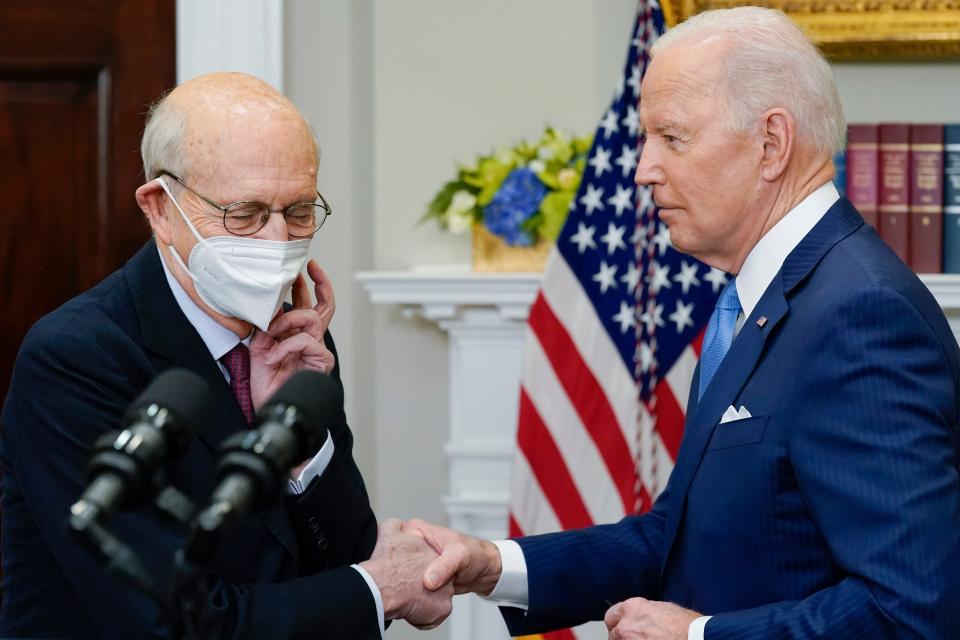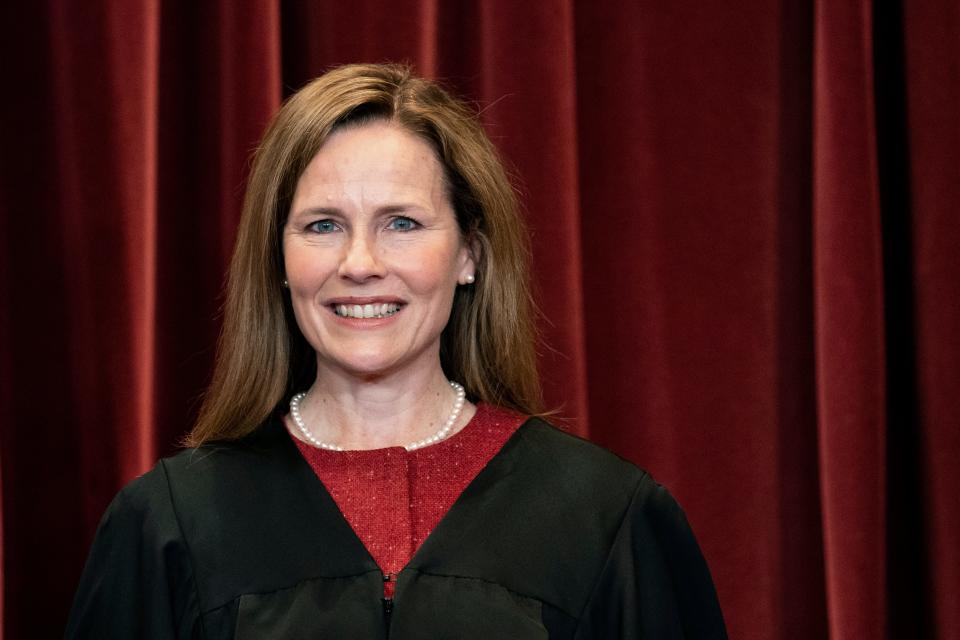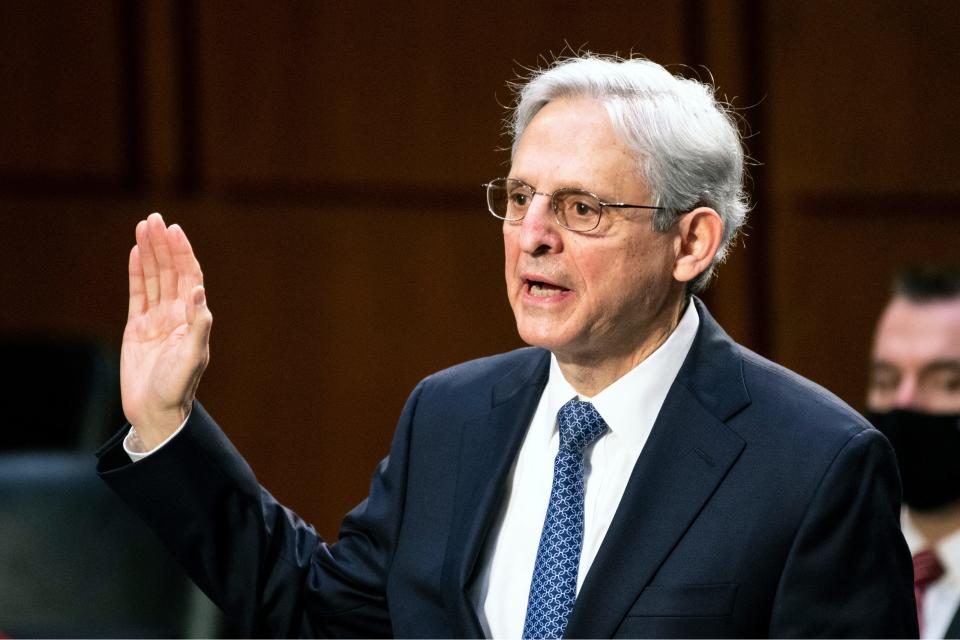Biden on Supreme Court nominations: what he's said about filling vacancies on the nation's highest court
- Oops!Something went wrong.Please try again later.
- Oops!Something went wrong.Please try again later.
- Oops!Something went wrong.Please try again later.
- Oops!Something went wrong.Please try again later.
- Oops!Something went wrong.Please try again later.
President Joe Biden will have an opportunity to nominate an associate justice to the Supreme Court after announcing the retirement of long-serving Justice Stephen Breyer Thursday.
The president said he will make a decision on Breyer's successor by the end of February. The 83-year-old justice will retire later this year.
"I have made no choice at this point," he said. "In the end, I will nominate a historic candidate, someone who is worthy of Justice Breyer's legacy."
While campaigning for president, Biden promised to name a Black woman to the nation's highest court for the first time in history. On Thursday, he reaffirmed that commitment. Biden already has nominated 62 women to the federal judiciary.

In April, the president announced he was forming a commission to study possibly increasing the number of Supreme Court justices from nine to 12. The move was a response to pressure from liberals after former President Donald Trump nominated three conservatives to the bench during his administration, expanding the conservative majority on the high court.
What else has Biden had to say about Supreme Court nominations?
Nominating the first Black woman to the Supreme Court
On Thursday, Biden said nominating a Black woman to the Supreme Court is "long overdue."
“I will keep that commitment,” he said.
He first made that pledge on the 2020 campaign trail and began vetting a list of nominees to fill a potential vacancy.
The admission was partial push-back against then-President Trump's criticism that Biden had not released a list of potential nominees to replace Justice Ruth Bader-Ginsburg, who died in September 2020 nearly two months before the election.

Biden said no other presidential candidate aside from Trump has ever released such a list, and that his own decisions should not be "based on a partisan election campaign."
"First, putting a judge's name on lists like that could influence that person's decision making as a judge. And that would be wrong," Biden said.
"Second, anyone put on a list like that under these circumstances will be subject to unrelenting political attacks, because any nominee I would select would not get a hearing until 2021 at the earliest."
Nominating a Black woman, Biden said, will be "the product of a process that extends our finest traditions, not the extension of what has torn the country apart for the last years."
'Not a fan' of court packing
The nomination of conservative Justice Amy Coney Barrett — Trump's third during his term — to succeed the liberal Ginsburg happened weeks before the 2020 presidential election. Conservative justices had a 6-3 majority on the bench after Barrett was confirmed.
During Barrett's Senate confirmation hearings that October, Biden publicly came out against expanding the number of justices on the bench, otherwise known as "court packing."

"I'm not a fan of court packing but I don't want to get off on that whole issue," Biden said during an interview with WKRC-TV in Cincinnati. "I want to keep focused. (President Trump) would love nothing better than to fight about whether or not I would, in fact, pack the court or not pack the court.”
The winner should choose the next nominee
While a presidential candidate, Biden wanted to delay the Senate confirmation process for Barrett until after Election Day 2020 — a sentiment echoed by many Democrats.
He condemned Trump's decision to nominate Barrett "before Justice Ginsburg could be laid to rest" and "after hundreds of thousands of Americans have already cast their ballots."

Biden also said targeting the Affordable Care Act, which was signed into law while he served as vice president to former President Barack Obama, was the Republican party's true purpose in rushing Barrett's nomination. Some critics of the ACA hoped the law would be struck down in the Supreme Court with a conservative majority.
"It's no mystery about what's happening here. President Trump was trying to throw out the Affordable Care Act. He's been trying to do it for the last four years," Biden said during a speech in Delaware in September 2020. "The Republican Party has been trying to eliminate it for a decade. Twice already, the Supreme Court has upheld that law."
More: Supreme Court Justice Stephen Breyer to step down, giving Biden a chance to make his mark
"Now, all of a sudden this administration believes they found a loophole: the tragedy of Justice Ginsburg's death," Biden said.
Senate Republicans denied a hearing to Merrick Garland
Barrett's nomination was unprecedented for another reason: Senate Republicans voted to confirm her to the Supreme Court during a presidential election year, but refused to hold confirmation hearings for Obama's nominee Merrick Garland – now Biden's Attorney General – in 2016, also an election year.

Garland was nominated to fill late-Justice Antonin Scalia's vacancy after he died in February 2016. Biden wrote in an article that Obama fulfilled his constitutional responsibility while Senate Republicans were "failing to fulfill their Constitutional obligation" by denying Garland a hearing.
"In my 36 years in the United States Senate, the Constitution was always our guidepost. Which meant that every single Supreme Court nominee got a hearing, a committee vote, and a floor vote. Period," Biden wrote. "And by the way, there is nothing in the Constitution or our history to support the view that no nominee should be voted on in the last year of a presidency."
Reach out to Chelsey Cox on Twitter at @therealco.
This article originally appeared on USA TODAY: Supreme Court nominations: What Biden has said about filling vacancies

